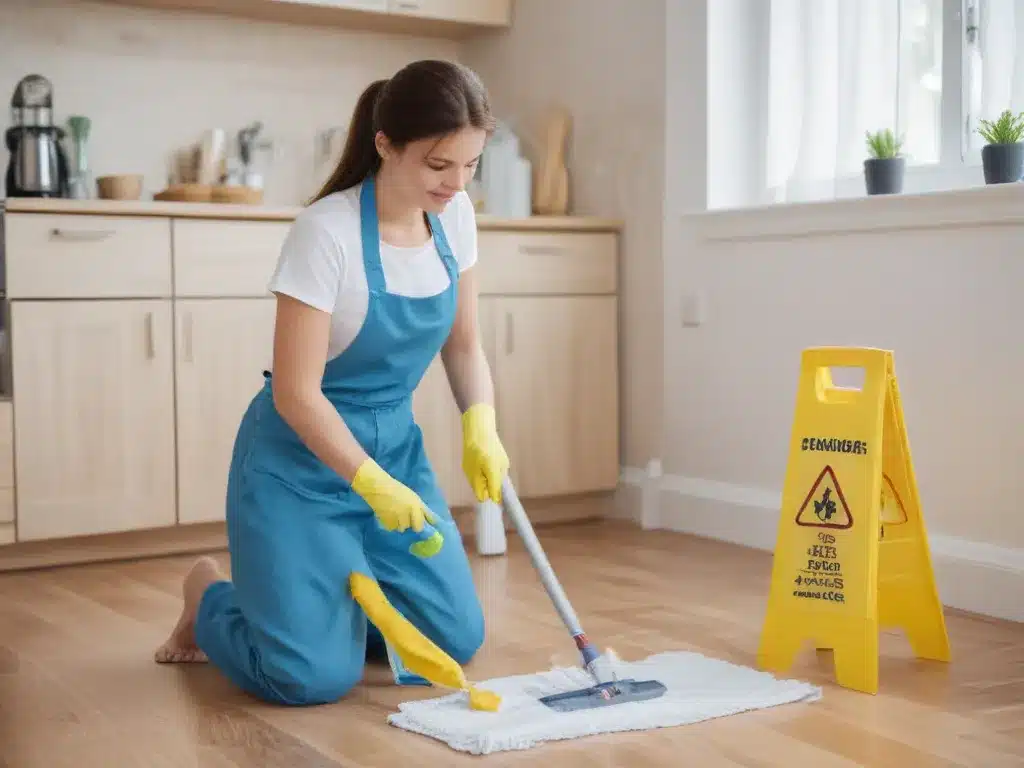Introduction
Maintaining a clean and hygienic environment is crucial for the well-being of our families. However, many common household cleaners contain harsh chemicals that can pose serious health risks, especially for children and pets. In this article, I will explore the dangers of harsh cleaners and provide safer alternatives to protect your loved ones while keeping your home spotless.
The Hidden Dangers of Harsh Cleaners
Harsh cleaners often contain a cocktail of toxic ingredients, including ammonia, chlorine, and volatile organic compounds (VOCs). These chemicals can cause various health issues, ranging from skin irritation and respiratory problems to more severe conditions like cancer and reproductive harm.
- Ammonia – This common ingredient in glass cleaners and floor cleaners can cause respiratory irritation, coughing, and eye irritation when inhaled or exposed to the skin.
- Chlorine – Found in bleach and disinfectants, chlorine can release toxic gases when mixed with other cleaning products, leading to respiratory distress and lung damage.
- Volatile Organic Compounds (VOCs) – VOCs are found in many cleaning products, including air fresheners, furniture polish, and oven cleaners. These compounds can cause headaches, dizziness, and long-term health effects like liver and kidney damage.
Furthermore, harsh cleaners can negatively impact indoor air quality, exacerbating respiratory conditions like asthma and allergies, especially in confined spaces with poor ventilation.
The Impact on Children and Pets
Children and pets are particularly vulnerable to the harmful effects of harsh cleaners due to their smaller size and developing bodies. Ingesting or inhaling these toxic substances can lead to serious consequences, including:
- Poisoning: Many harsh cleaners are highly poisonous if ingested, causing nausea, vomiting, and even organ damage.
- Developmental Issues: Exposure to certain chemicals in harsh cleaners during critical stages of development can potentially lead to learning disabilities, behavioral problems, and impaired growth.
- Respiratory Problems: The fumes and vapors from harsh cleaners can irritate the delicate respiratory systems of children and pets, triggering asthma attacks and other respiratory issues.
It’s crucial to keep harsh cleaners out of reach and properly store them in secure, child-proof containers to prevent accidental exposure.
Safer Alternatives for a Healthy Home
Fortunately, there are numerous safer and more eco-friendly alternatives to harsh cleaners that can effectively clean your home without compromising your family’s health. Here are some options to consider:
-
Vinegar: A versatile and natural cleaning agent, vinegar can effectively remove dirt, grease, and grime from various surfaces. Its mild acidity makes it a powerful disinfectant as well.
-
Baking Soda: This pantry staple is an excellent abrasive cleaner and deodorizer. Combine it with water to create a gentle scrub for sinks, countertops, and bathtubs.
-
Essential Oils: Not only do essential oils provide a pleasant aroma, but many also possess natural antibacterial and antifungal properties, making them ideal for homemade cleaning solutions.
-
Hydrogen Peroxide: This mild oxidizing agent is an effective disinfectant and can be used to clean surfaces, whiten laundry, and even remove stains.
-
Plant-Based Cleaners: Many eco-friendly brands offer plant-based cleaning products that are free from harsh chemicals and are biodegradable, making them safer for your family and the environment.
Creating a Safer Cleaning Routine
To ensure a healthier living environment for your family, consider adopting the following practices:
-
Read Labels Carefully: Always read the ingredient labels on cleaning products and avoid those containing harsh chemicals or warning labels indicating potential health hazards.
-
Proper Ventilation: When using any cleaning products, ensure proper ventilation by opening windows and doors, and consider using fans to improve air circulation.
-
Wear Protective Equipment: If you must use harsher cleaners, wear gloves, goggles, and a mask to minimize exposure.
-
Make Your Own Cleaners: Consider making your own eco-friendly cleaning solutions using natural ingredients like vinegar, baking soda, and essential oils. There are numerous recipes available online.
-
Hire Professional Cleaning Services: If you prefer the convenience of professional cleaning services, look for companies that prioritize eco-friendly and non-toxic cleaning products.
Real-Life Examples and Testimonials
To illustrate the importance of avoiding harsh cleaners, consider the following real-life examples and testimonials:
Asthma Trigger: A Mother’s Perspective
“My son has severe asthma, and using harsh cleaners in our home would often trigger asthma attacks. After switching to natural, plant-based cleaners, his symptoms significantly improved, and we no longer have to worry about exposing him to toxic fumes.” – Sarah, a mother of two.
Pet Safety: A Veterinarian’s Advice
“As a veterinarian, I’ve seen too many cases of pets accidentally ingesting or being exposed to harsh cleaning products, leading to serious health complications. I always recommend pet owners use pet-friendly, non-toxic cleaning solutions to keep their furry friends safe.” – Dr. Emily Smith, DVM.
Eco-Friendly Living: A Family’s Journey
“We made the switch to eco-friendly cleaners not only for our health but also for the planet. We’ve noticed a significant improvement in our indoor air quality, and we feel good knowing we’re doing our part to reduce our environmental impact.” – The Garcia family, advocates for sustainable living.
Conclusion
Protecting your family’s health should be a top priority when it comes to household cleaning. By avoiding harsh cleaners and embracing safer, eco-friendly alternatives, you can create a clean and healthy living environment without compromising the well-being of your loved ones. Remember, a little effort towards using natural and non-toxic cleaners can go a long way in safeguarding your family’s health and contributing to a greener future.







